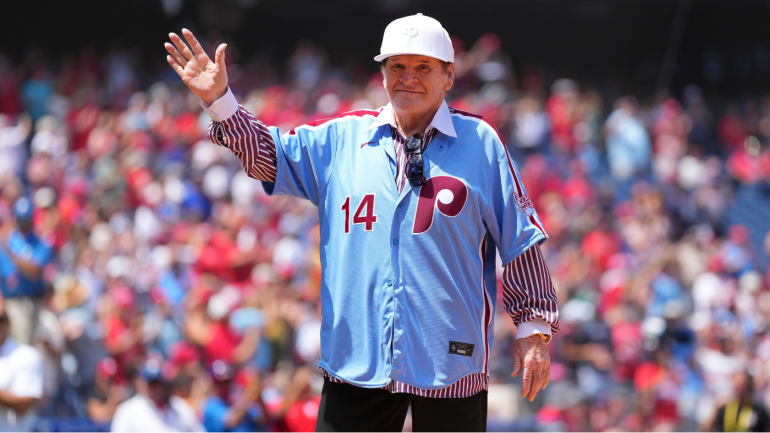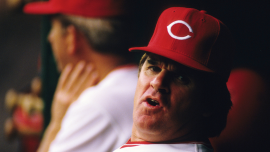Pete Rose reinstated off MLB's permanently ineligible list: Mike Schmidt, former teams, others react
A total of 17 players are no longer banned from baseball as a result of MLB commissioner Rob Manfred's decision

On Tuesday, Major League Baseball commissioner Rob Manfred effectively changed baseball's permanently ineligible list to a lifetime ineligible list. Manfred ruled that "permanent ineligibility ends upon the passing of the disciplined individual," and therefore Pete Rose, Shoeless Joe Jackson, other members of the 1919 Black Sox, and others have been removed from the permanently ineligible list. A total of 17 players are no longer banned from baseball.
"In my view, a determination must be made regarding how the phrase 'permanently ineligible' should be interpreted in light of the purposes and policies behind Rule 21, which are to: (1) protect the game from individuals who pose a risk to the integrity of the sport by prohibiting the participation of such individuals; and (2) create a deterrent effect that reduces the likelihood of future violations by others," Manfred wrote in a statement.
"In my view, once an individual has passed away, the purposes of Rule 21 have been served. Obviously, a person no longer with us cannot represent a threat to the integrity of the game. Moreover, it is hard to conceive of a penalty that has more deterrent effect than one that lasts a lifetime with no reprieve. Therefore, I have concluded that permanent ineligibility ends upon the passing of the disciplined individual, and Mr. Rose will be removed from the permanently ineligible list."

Manfred's decision to remove deceased individuals from the permanently ineligible list paves the way for Rose, Jackson, and the 15 others to be considered for the National Baseball Hall of Fame. Specifically, they will be considered for the Classic Baseball Era Committee, which votes on its eight-person ballot next in December 2027. The Classic Baseball Era Committee considers those who made their greatest impact on the game prior to 1980.
Here are some reactions to Manfred's ruling and specifically Rose's sudden eligibility to be considered for the Hall of Fame, starting with a statement from Bob Castellini, owner of the Cincinnati Reds, Rose's longtime team:
"On behalf of the Reds and our generations of loyal fans, we are thankful for the decision of Commissioner Manfred and Major League Baseball regarding the removal of Pete Rose from the permanently ineligible list. Pete is one of the greatest players in baseball history, and Reds Country will continue to celebrate him as we always have. We are especially happy for the Rose family to receive this news and what this decision could mean for them and all of Pete's fans."
Here is what the Philadelphia Phillies, another one of Rose's teams, had to say about Manfred's ruling:
"The Phillies support today's decision by Commissioner Manfred and Major League Baseball to remove Pete Rose from the permanently ineligible list. As one of the greatest players in the history of the game, Pete made significant on-field contributions to the Phillies over his five seasons (1979-83) with the club, highlighted by our first World Series title in 1980."
Hall of Famer Mike Schmidt, arguably the greatest third baseman to ever play the game, was Rose's teammate with the Phillies from 1979-83. Here's what Schmidt said in a statement:
"It's a great day for baseball as Commissioner Manfred has reinstated Pete Rose, making him eligible for the National Baseball Hall of Fame. The ongoing question of whether Pete Rose should or shouldn't be in the Hall will be answered by a select panel in the next Classic Baseball Era Committee. Congratulations to Pete's family, his teammates, as well as his supporters who have waited many years for this opportunity for consideration."
The late Bart Giamatti was baseball's commissioner when Rose was placed on the permanently ineligible list, which Rose agreed to as part of a settlement to avoid litigation. Marcus Giamatti, Bart's son, called Manfred's decision a dark day for baseball. From USA Today:
"It's a serious dark day for baseball," Marcus Giamatti, the 63-year-old son of late former commissioner Bart Giamatti, who permanently suspended Rose in 1989, told USA TODAY Sports. "For my dad, it was all about defending the integrity of baseball. Now, without integrity, I believe the game of baseball, as we know it, will cease to exist. How, without integrity, will the fans ever entrust the purity of the game.
"The basic principle that the game is built on, fair play, and that integrity is going to be compromised. And the fans are losers. I don't know how a fan could go and watch a game knowing that what they're seeing may not be real and fair anymore. That's a really scary thought."
Here now are several social media reactions to Manfred's ruling:
Pete Rose’s reinstatement brought to you by FanDuel!
— Robert Stock (@RobertStock6) May 13, 2025
Absolutely pathetic they waited for Pete Rose to pass away before giving him his day in the sun
— Gary Sheffield Jr. (@GarysheffieldJr) May 13, 2025
Reprehensible https://t.co/6a0q2AevIA
So let me get this straight—it’s OK to get into the HOF if you blatantly broke gambling rules, but not if you blatantly broke rules on steroids that MLB was too weak to put on the books?
— Albert Breer (@AlbertBreer) May 13, 2025
I don’t care that much if Pete Rose is in or not, but this stuff continues to be a mess.
Pete Rose doesn’t belong in the Hall of Fame. Nor does Shoeless Joe Jackson.
— Paul Hembekides (Hembo) (@PaulHembo) May 13, 2025
Rose died at age 83 in October. He played 24 seasons with the Reds, Phillies, and Montreal Expos from 1963-86 and retired as baseball's all-time hits leader. Rose also managed the Reds from 1984-89. It was during that time he was found to have bet on baseball, including games the Reds were involved in.
He accepted a placement on baseball's permanently ineligible list on August 24, 1989. Rose denied he bet on baseball up until he admitted it in December 2003.

Shoeless Joe and seven other members of the 1919 Chicago White Sox were placed on the permanently ineligible list after being accused of taking bribes to throw the World Series against the Reds. A grand jury eventually acquitted Jackson and his teammates, though commissioner Kenesaw Mountain Landis saw fit to ban the players anyway.
![[object Object] Logo](https://sportshub.cbsistatic.com/i/2020/04/22/e9ceb731-8b3f-4c60-98fe-090ab66a2997/screen-shot-2020-04-22-at-11-04-56-am.png)



















